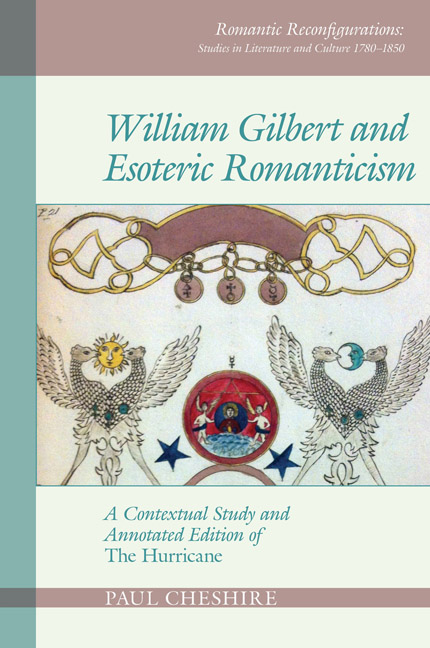 William Gilbert and Esoteric Romanticism
William Gilbert and Esoteric Romanticism from Part Two - The Hurricane
So you see that I was unable to get any information whatsoever about the Phoenix in the course of my wanderings through Europe; I therefore determined to set sail for America, in the hope that I might be more fortunate among the savages of that Continent.
Michael MaierThe Hurricane and its Notes
By word-count alone the notes to The Hurricane take up nearly three-quarters of the total contents of the book; the notes are not subordinate but an essential part of a work that combines verse and prose in the hybrid form known as prosimetric. Well-known examples of this genre in European literature include Dante's Vita Nuova and Il Convivio, in which Dante combined his own poems with extended philosophical commentary and narrative to create a wider frame within which the poems were set. Thomas Blount's Glossographia of 1656 is cited by OED as the first English work to use the term ‘prosimetricall’ as a name for this mixed form.
The practice of adding notes to poems burgeoned during the Romantic era. By 1825 Xavier de Maistre felt that this had gone too far and joked about having made a good preparation toward writing a poem by accumulating ‘five hundred pages of notes, which comprise, as everyone knows, all the merit, and fill out all the bulk, of most modern poems’. Robert Southey delighted in adding notes to his epics (the example of Thalaba has already been noted); these are usually quotations from his exotic source material that it seems he could not resist sharing with the reader. Shelley's Queen Mab: a Philosophical Poem, with Notes (1813) is closer to Gilbert's ‘theosophical’ Hurricane in style, propounding its author's convictions in the unrestrained way that private publication makes possible. Shelley's notes – while not reaching Gilbertian proportions – take up as much space as his nine-canto poem, and are intended to support its philosophical message.
If Gilbert was following a precedent in his use of this form in the mid-1790s, the influence is likely to be Erasmus Darwin's The Economy of Vegetation, part one of The Botanic Garden (1791). Darwin's extensive notes sometimes amounted to wholly independent essays, and Gilbert's references to Darwin's book in his own Hurricane notes show how closely he had read it (HN §17).
To save this book to your Kindle, first ensure no-reply@cambridge.org is added to your Approved Personal Document E-mail List under your Personal Document Settings on the Manage Your Content and Devices page of your Amazon account. Then enter the ‘name’ part of your Kindle email address below. Find out more about saving to your Kindle.
Note you can select to save to either the @free.kindle.com or @kindle.com variations. ‘@free.kindle.com’ emails are free but can only be saved to your device when it is connected to wi-fi. ‘@kindle.com’ emails can be delivered even when you are not connected to wi-fi, but note that service fees apply.
Find out more about the Kindle Personal Document Service.
To save content items to your account, please confirm that you agree to abide by our usage policies. If this is the first time you use this feature, you will be asked to authorise Cambridge Core to connect with your account. Find out more about saving content to Dropbox.
To save content items to your account, please confirm that you agree to abide by our usage policies. If this is the first time you use this feature, you will be asked to authorise Cambridge Core to connect with your account. Find out more about saving content to Google Drive.